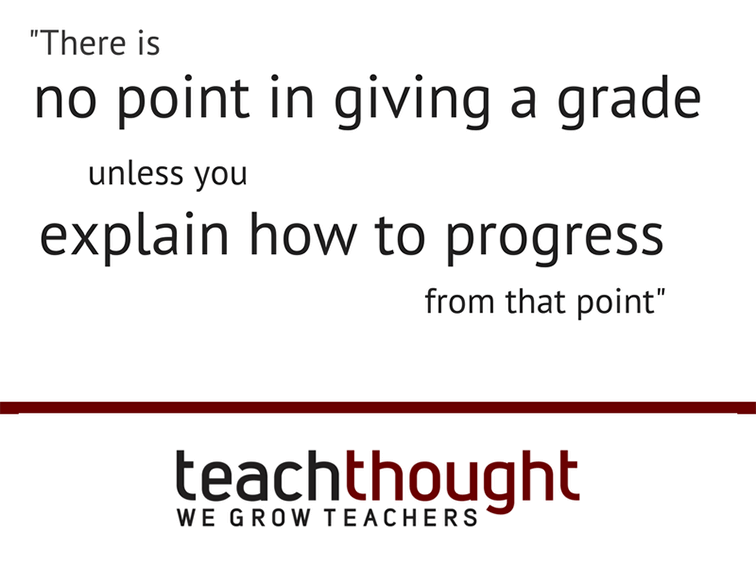
The Importance Of Being Specific In Assessment
by TeachThought Staff
We all know that time demands on teachers seem to be ever-growing. Sometimes I feel I must be working in dog years, so any way to reduce the burden is worth exploring. One approach is the use of verbal feedback.
Verbal feedback is quick, and it is effective, but–and it is a big but–only if given correctly.
Like all learning feedback, comments must be directed towards developing and acknowledging skill: giving students tangible understandings of how to progress, or specific comments identifying what was good about the work they produced. Let’s look at these 2 aspects in detail:
When seeking to develop skills, feedback (and it must be timely) is only useful if it informs the student what areas need to be worked on. There is no point in giving a grade to anything unless you explain how to progress from that point. The same is true when answering questions in class. There is no point in just saying ‘no’ to an answer. The student is left without knowing how to adjust their thinking. A good teacher will reframe the question, or prompt perspectives and engage others in the discussion so the student can progress from their first thought. The same applies when wandering the room looking at performance in tasks.
See also The Most Important Question Every Assessment Should Answer
Questions about the work students have resulted in the teacher being able to check for understanding and ascertain whether students have grasped the concept or are just parroting information.
Questions that encourage deeper and more expansive thinking are as effective as any written information.
Acknowledging skills is crucial. Simply praising students’ work has little value, as the intended motivational gains are wiped away by the establishment of a culture of reliance, a culture that diminishes independent thinking. There are other excellent discussions about this phenomenon by David Didau, but perhaps none more succinct than Kohn. But whether you agree or disagree with this notion, only using praise to respond to a student’s work misses a really valuable opportunity to let the student know why her or his work meets the required criteria, and thus a lost opportunity to drive their next learning experience.
If you take the judgment out of your feedback, the student can internalize the process in a deeper way. There is a big difference in saying to a student ‘I really like that story’ compared to ‘the way the sentences have been structured creates an anxious mood’. This type of feedback not only engages students to reflect on the key aspects of what made the work successful, which reinforces those skills for the next time, but it also creates a culture of focusing always on the criteria.
See also 20 Ways To Provide Effective Feedback For Learning
Many teachers are wary of replacing written feedback with verbal feedback, and understandably so as it is much less quantifiable, and thus OFSTED repellent (insert any gatekeeper here). But if you have ever been in a classroom where a teacher is delivering verbal feedback with skill, you will be convinced that learning doesn’t always have to be so quantifiable, as you can see it is happening right before your eyes.
Obviously written feedback most certainly has its place, but good quality verbal feedback most certainly does also. The art, of course, is in working out the balance between the two.
